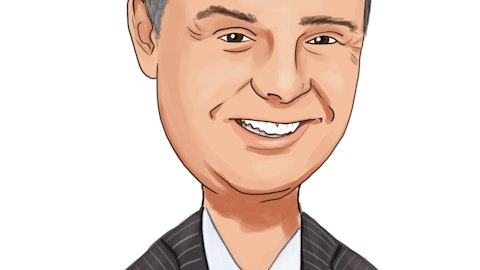Michael Rose: Jerry, that’s a great point, and just to kind of follow up on that, do you feel like you have the products in place that your competitors have to be competitive, or is that still a work in progress as you roll off the core systems integration and maybe some other products and services? Do you feel like you are where you need to be, or do you feel like there’s still more work to be done to compete more effectively, because I think everybody has changed their deposit incentives, right, so I mean, do you have the products and capability to be successful in your strategy? Thanks.
Jerry Plush: Yes, I definitely think so, and I think they’re going to be further enhanced post this conversion in May. I think that at the end of the day, a lot of the deposit gathering we do, we’re a people business, right – it’s personal, it’s relationships. All the expansion we’ve done in private banking, we’ll continue to do. These new offices, I mean, they are in very deposit-rich markets and this is very targeted by us to be able to basically have some physical presence, certainly not the big size branches of the past but certainly smaller and just very well located in the right spots. I think it’s a combination of all these things that are going to get there, but again directly to your question, I think it’s a question for me of saying, hey, we’re okay today and we’ll get better as we go forward on the product and service side.
Michael Rose: Perfect, and then maybe just one final one for me, just on credit. Obviously CECL implementation, but ex-that, you did build the reserve, which I think is prudent. I appreciate all the detail in the back of the deck on commercial real estate – that’s certainly a lot of focus. Can you help us get comfortable with credit and where you are from a reserve perspective? You’ve had some chunkier loans come through over the past couple years. Just trying to size the bucket of potential credits that you could be working through over the next couple quarters and if we should expect the reserve to continue to grow from here. Thanks.
Jerry Plush: Yes, well, I think you know that under CECL, you will see higher provisioning just as a result because you’re doing lifetime expected, right, and so as we grow, you’ll see more provision expense than you would have historically seen, and that’s really what the purpose of this change was all about from an accounting standpoint. I think the question on the quarter, and there was definitely a little bit of noise vis-Ã -vis we changed the policy on the consumer side, where we were going to 120 days to charge-off. We backed that to 90 days, so somebody goes three cycles, it’s done, it’s charged off and then it’s in full recovery mode, so you had a catch-up adjustment that also flowed through. Regarding the one specific credit that Carlos referenced on the call a couple of times related to New York, obviously it’s a CRE relationship, it is something we put a lot of time and energy in understanding, and we decided that it was the prudent thing to do on that particular credit to take that formally in–well, it’s basically a $2.5 million incremental adjustment on that credit in particular.


